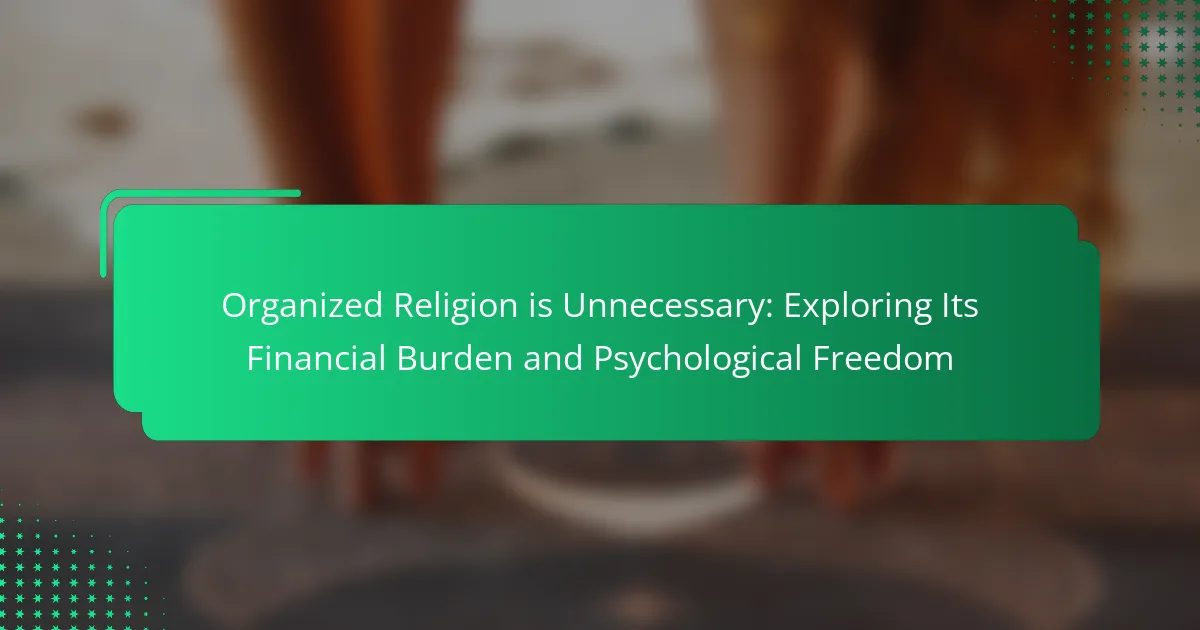Organized religion often imposes financial burdens through tithing and donations, creating stress and limiting personal financial freedom. This article explores how distancing from organized religion can lead to psychological liberation, increased autonomy, and improved mental well-being. It also examines the financial implications of these obligations and alternative paths for personal growth that align with individual values.

How Does Organized Religion Impact Financial Decisions?
Organized religion can create financial burdens by imposing tithing and donations, limiting personal financial freedom. This financial pressure often leads to psychological stress, as individuals may feel obligated to contribute despite their financial situation. The unique attribute of psychological freedom emerges when individuals choose to distance themselves from these obligations, allowing for more autonomous financial decisions. As a result, the absence of organized religion can enhance one’s ability to allocate resources according to personal priorities rather than communal expectations.
What Are the Financial Obligations Associated with Organized Religion?
Organized religion often imposes significant financial obligations on its followers. These can include tithes, donations, and fees for ceremonies, which collectively burden individuals seeking spiritual fulfillment. Additionally, some religious institutions require financial commitments for membership or participation in specific activities. These obligations can lead to economic strain, detracting from psychological freedom and personal financial stability. As a result, many individuals question the necessity of organized religion in light of its financial demands and the pursuit of a more liberated spiritual experience.
How Do Financial Burdens Affect Mental Well-being?
Financial burdens significantly impact mental well-being by causing stress and anxiety. The financial demands of organized religion can contribute to feelings of inadequacy and pressure. Individuals may experience psychological freedom when they reduce or eliminate these financial obligations. Studies show that financial stress correlates with increased rates of depression and anxiety disorders. Therefore, addressing these burdens can lead to improved mental health outcomes.
What Are Common Examples of Financial Strain?
Financial strain often arises from organized religion due to various costs and obligations. Common examples include tithing, which can significantly impact personal finances, and fees for religious events or ceremonies. Additionally, the pressure to contribute to community projects may lead to unplanned expenses. The psychological burden of these financial demands can hinder personal freedom, creating stress and anxiety.
How Do Donations Influence Personal Finances?
Donations can significantly impact personal finances by creating financial obligations and potentially altering spending habits. Organized religion often requires regular contributions, which can strain budgets. This financial burden may lead to stress and affect overall well-being. Individuals may experience psychological freedom when they reduce or eliminate these obligations, allowing for more discretionary spending and savings.

What Psychological Freedoms Are Gained by Leaving Organized Religion?
Leaving organized religion can lead to significant psychological freedoms, including reduced guilt, increased autonomy, and enhanced self-identity. Individuals often experience liberation from dogmatic beliefs, allowing for personal exploration and growth. This newfound freedom fosters critical thinking and encourages the pursuit of personal values over imposed doctrines. As a result, many report improved mental well-being and a sense of empowerment in their life choices.
How Does Financial Independence Contribute to Mental Clarity?
Financial independence enhances mental clarity by reducing financial stress and increasing personal freedom. This liberation fosters a clear mindset, enabling individuals to focus on their goals and aspirations. Studies show that financial stability correlates with lower anxiety levels, leading to improved decision-making and overall well-being. Additionally, the absence of financial burdens allows for greater exploration of personal values and beliefs, further contributing to psychological freedom.
What Are the Psychological Effects of Reduced Financial Pressure?
Reduced financial pressure can lead to significant psychological benefits, including increased mental well-being and freedom from stress. Individuals often experience enhanced self-esteem and autonomy, as they are less burdened by economic constraints. This psychological liberation can foster a greater sense of purpose and fulfillment in life. Additionally, studies indicate that financial stability correlates with lower anxiety levels and improved overall health. As a result, individuals may find themselves more engaged in personal relationships and community activities, further enriching their emotional landscape.
How Can One Experience Increased Autonomy?
Increased autonomy can be experienced by reducing reliance on organized religion, which often imposes financial obligations and psychological constraints. By breaking free from these structures, individuals can explore personal beliefs and values that align with their authentic selves. This shift fosters a sense of empowerment and self-determination, enabling greater control over one’s life choices. Financially, avoiding the costs associated with religious institutions allows for more freedom in resource allocation, further enhancing autonomy.
What Role Does Reduced Guilt Play in Financial Decisions?
Reduced guilt can significantly influence financial decisions by promoting psychological freedom. When individuals feel less guilt associated with their financial choices, they are more likely to make decisions based on personal values rather than external pressures. This shift encourages a focus on long-term financial health, enabling individuals to prioritize investments and savings over immediate gratification. As a result, reduced guilt fosters a more empowered approach to financial management, leading to better outcomes and enhanced overall well-being.

What Unique Perspectives Exist on Financial Contributions to Organized Religion?
Financial contributions to organized religion often impose a significant burden on individuals, leading to a sense of psychological freedom when these ties are severed. Many argue that the financial demands of tithing and donations can create stress and limit personal financial growth. Additionally, the unique perspective that financial liberation from organized religion can lead to greater autonomy and self-determination resonates with many who seek to redefine their spiritual paths. This shift in perspective emphasizes the psychological benefits of reducing or eliminating financial obligations to religious institutions.
How Do Different Cultures View the Financial Aspects of Religion?
Different cultures view the financial aspects of religion as burdensome or liberating, impacting psychological freedom. In many Western societies, organized religion is often seen as an unnecessary financial commitment, leading to a push for more individual spiritual practices. Conversely, in some Eastern cultures, religious institutions provide essential community support, justifying their financial contributions. The psychological freedom from abandoning organized religion can lead to a more personal and direct relationship with spirituality, reducing the stress associated with financial obligations. This duality reflects how cultural values shape perceptions of the financial implications of faith.
What Are the Psychological Impacts of Tithing in Various Faiths?
Tithing can provide psychological benefits across various faiths, enhancing a sense of community and purpose. In Christianity, tithing fosters gratitude and reduces financial anxiety. In Judaism, it promotes social responsibility and strengthens communal ties. In Islam, zakat, a form of tithing, encourages empathy and reduces wealth disparity. These practices can lead to increased mental well-being, a sense of belonging, and fulfillment.

What Rare Psychological Insights Arise from Financial Decisions Related to Organized Religion?
Financial decisions tied to organized religion often lead to psychological burdens, revealing insights about personal freedom. Individuals may experience guilt or anxiety over financial contributions, impacting mental health. Research indicates that detachment from these financial obligations can enhance psychological well-being, fostering a sense of autonomy. This shift allows for a reallocation of resources toward personal growth and fulfillment, underscoring the rare psychological benefits of financial independence from organized religion.
How Can Leaving Organized Religion Lead to Unexpected Financial Opportunities?
Leaving organized religion can open up unexpected financial opportunities by reducing financial burdens associated with tithing, donations, and religious obligations. Individuals often find they have more disposable income, which can be redirected towards investments or savings. Additionally, the psychological freedom gained from distancing oneself from religious structures can lead to improved decision-making and risk-taking in financial matters. This newfound autonomy may inspire entrepreneurial ventures or career changes that align more closely with personal values and passions, ultimately enhancing financial prospects.
What Are the Long-term Mental Health Effects of Financial Freedom from Religious Obligations?
Financial freedom from religious obligations can lead to improved mental health by reducing anxiety and promoting self-identity. Individuals often experience relief from guilt and pressure associated with financial contributions to religious institutions. This newfound autonomy fosters personal growth and enhances overall well-being. Research indicates that people who disengage from financial commitments to organized religion often report lower stress levels and greater life satisfaction. As a result, the long-term mental health effects include increased resilience and a more positive outlook on life.

What Best Practices Can Help Individuals Navigate Financial Decisions Related to Religion?
Individuals can navigate financial decisions related to religion by prioritizing personal values over institutional demands. Assessing the financial implications of religious obligations can lead to greater psychological freedom. Evaluating alternatives, such as secular community support, may reduce unnecessary financial burdens. Additionally, creating a budget that reflects personal beliefs can help maintain financial stability while honoring one’s values.
How Can One Create a Personal Financial Plan Post-Religion?
Creating a personal financial plan post-religion involves reassessing priorities and values. Begin by identifying your financial goals, such as saving for retirement or paying off debt. Next, establish a budget that reflects your new priorities, ensuring it aligns with your lifestyle changes. Consider consulting a financial advisor for tailored guidance, especially if you’re unfamiliar with investment strategies. Additionally, track your expenses diligently to identify areas for improvement. Lastly, regularly review and adjust your financial plan to accommodate changes in your circumstances or goals.
What Common Mistakes Should Be Avoided When Making Financial Decisions After Leaving Organized Religion?
Avoiding common mistakes when making financial decisions after leaving organized religion involves careful consideration of emotional and practical factors. First, individuals might overlook the importance of budgeting, leading to impulsive spending. Second, failing to seek financial advice can result in poor investment choices. Third, neglecting to account for potential psychological impacts, such as feelings of guilt or uncertainty, can hinder sound decision-making. Lastly, not establishing a clear financial goal may lead to aimless financial behavior. Recognizing these pitfalls can foster better financial health and psychological freedom.
What Expert Insights Can Guide Financial Independence from Religious Ties?
Financial independence can be achieved by recognizing the financial burdens and psychological constraints imposed by organized religion. Expert insights suggest that detaching from religious obligations can free up resources and mental energy. This shift allows individuals to focus on personal financial goals and mental well-being. Research shows that people who disengage from organized religion often report higher levels of financial literacy and better investment practices, leading to increased savings and wealth accumulation. Embracing secular values may also foster a more open mindset towards financial education and entrepreneurial opportunities.


